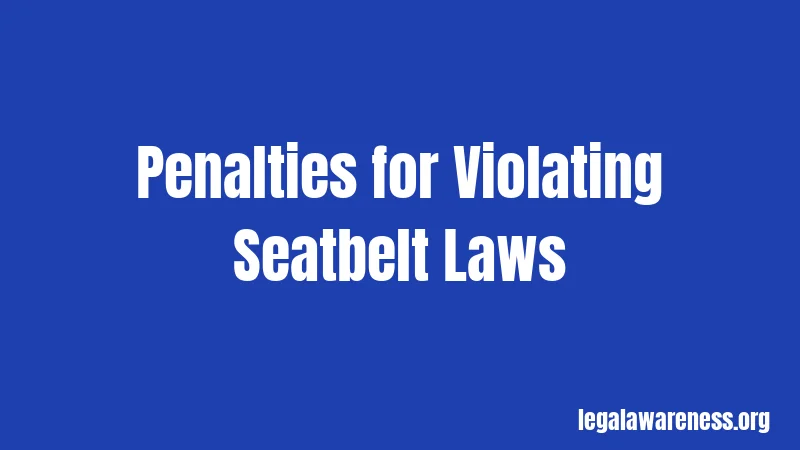Illinois Seatbelt Laws (2026): Essential Safety Rules You Need to Know
Most people buckle up without thinking twice. It’s automatic, right? But in Illinois, seatbelt laws are actually stricter than you might realize. Not everyone knows all the rules. The penalties can surprise you too. Let’s break down exactly what Illinois law requires from you and your passengers.
Honestly, this stuff matters. A simple mistake could cost you money and points on your driving record. So stick with me. We’ll cover everything you need to know.
What Is a Seatbelt Law?

A seatbelt law is a rule that requires drivers and passengers to wear seatbelts while the car is moving. Think of it like a traffic safety regulation that protects you. These laws exist because seatbelts save lives. Studies show they reduce serious injury risk by about 45 percent. That’s huge.
Illinois takes seatbelt safety seriously. The state has comprehensive laws covering who must wear them, when, and under what circumstances. These aren’t suggestions. They’re legal requirements.
Illinois Seatbelt Requirements
Who Must Wear a Seatbelt?
In Illinois, the law is pretty clear on this one. Drivers must wear seatbelts. That’s non-negotiable. All front-seat passengers must wear seatbelts too. Back-seat passengers also have to buckle up. Yep, that’s right. The law applies to everyone in the vehicle.
Now, here’s where things get specific. Children have extra requirements. Kids under 8 years old must use a child safety seat or booster seat. Kids from ages 8 to 15 can use either a seatbelt or an appropriate car seat. But wait, there’s more. Some exceptions exist for medical reasons. If a doctor says someone shouldn’t wear a seatbelt, they might be exempt. But you’d need documentation.
Wondering if this applies to you? If you’re sitting in a moving vehicle in Illinois, the answer is almost definitely yes.
The Basic Rule
Illinois law requires all occupants to properly wear seatbelts at all times. Properly means the belt sits across your lap and shoulder. Not just the lap. Not wrapped around your neck. The way it’s designed to work is the way it needs to work.
Drivers are responsible for enforcing this rule. If your passengers aren’t buckled up, you could face penalties. Think of it like this: you’re accountable for your vehicle’s safety compliance. That responsibility sits on you as the driver.
Penalties for Violating Seatbelt Laws

So what happens if you break this law? The consequences are real.
First Offense
Your first violation can cost you a fine. In Illinois, you could face a fine of up to $50 for a first seatbelt violation. That might not sound like much, but it adds up fast. You’ll also get a ticket on your driving record. Some insurance companies bump up rates after safety violations.
Not major compared to other traffic violations, but still no joke. Pretty straightforward punishment for a simple rule.
Additional Violations
Get caught again, and things get stricter. A second violation within a five-year period increases the fine. You could face fines up to $100. Multiple violations look worse on your driving record. They can affect your insurance rates more seriously too.
Honestly, this is the part most people underestimate. One ticket seems minor. But repeated violations add up to real money and driving record problems.
Child Safety Seat Violations
Child safety seat violations carry stiffer penalties. You could face fines up to $100 for improper child restraint. This is one area where Illinois doesn’t mess around. Why? Because protecting kids is non-negotiable.
The state takes these violations seriously enough to make them cost more. That’s intentional. It sends a message about priority.
Illinois Law Details
Primary vs. Secondary Enforcement
Here’s something that might surprise you. Illinois uses primary enforcement for seatbelts. That means an officer can pull you over specifically for not wearing a seatbelt. They don’t need another reason.
In secondary enforcement states, officers can only cite you for seatbelts if they’ve stopped you for something else. Not in Illinois. The law itself is enough reason for a traffic stop. Police take this seriously.
Exceptions and Special Cases
Certain exceptions exist to Illinois seatbelt requirements. Postal workers making local deliveries don’t need to wear seatbelts while working. This exception applies only to their job duties. Off-duty, regular rules apply.
People with documented medical conditions might get exemptions. A doctor’s letter explaining the medical reason could help. You’d need to carry documentation. Even so, the law still prefers everyone belt up when possible.
Vehicles manufactured before 1968 sometimes have exemptions. They might not have seatbelts installed. If your car predates modern safety requirements, you’d be exempt by necessity. But if your vehicle has seatbelts, you must use them.
Recent Changes
Illinois updated its child safety seat laws in recent years to align with safety recommendations. The current rules became stricter to better protect young passengers. Stay informed about these changes because they affect families with children.
How to Stay Compliant

Proper Seatbelt Usage
Sound complicated? It’s actually not. Here’s what you need to do.
The lap belt goes across your hips and lower abdomen. The shoulder belt goes diagonally across your chest. Both need to be snug but comfortable. Never twist the belt. Never put it behind your back. That defeats the entire purpose.
Adjust your seat position so the belt sits properly. Too high and it doesn’t protect your abdomen. Too low and it puts pressure on your stomach. Getting this right takes literally thirty seconds. Do it once and you’re set.
Children need age and size-appropriate restraints. This isn’t just a preference. It’s the law. Improper child restraints put young passengers at serious risk. Use the right equipment for their age and size.
Check Your Equipment
Your seatbelts deserve attention too. Make sure they fasten securely. Test them occasionally. A frayed or damaged belt won’t protect you properly. If your seatbelt doesn’t work right, get it fixed immediately.
Child safety seats should be installed correctly. Many people install them wrong. Free inspection services exist at hospitals and police departments. Seriously consider getting a professional check. It literally could save your child’s life.
Teach Your Passengers
If you’re driving with others, encourage them to buckle up. Model the behavior yourself. Buckle up before you do anything else. Make it the norm in your vehicle. Kids especially learn from what they see you do.
Okay, pause. This part is important. Your passengers’ safety is your responsibility. That means creating a culture where seatbelts are non-negotiable. No exceptions.
Frequently Asked Questions
Can I get a ticket if my passenger isn’t wearing a seatbelt? Yes. As the driver, you’re responsible for your passengers’ seatbelt compliance. If adult passengers refuse to buckle up, you could be cited. For children, it’s even stricter.
What if I have a medical condition that makes seatbelts uncomfortable? You might qualify for a medical exemption. Get documentation from your doctor. Carry it with you. Not all discomfort qualifies though. The exemption covers serious medical conditions only.
Are there any age groups exempt from seatbelt laws? No. Everyone in the vehicle must wear a seatbelt or appropriate restraint. Babies need carriers. Young children need safety seats or booster seats. Teenagers and adults need regular seatbelts.
How much is a seatbelt ticket in Illinois? First offense: up to $50. Additional violations within five years can reach $100. Child safety seat violations: up to $100.
Can police stop me just for not wearing a seatbelt? Yes. Illinois uses primary enforcement. Not wearing a seatbelt alone is a valid reason for a traffic stop. Officers don’t need another reason.
Final Thoughts
Illinois seatbelt laws are straightforward. Everyone buckles up. Children use appropriate restraints. Drivers are responsible for compliance. Simple as that.
But here’s the real point. These laws exist because seatbelts work. They save lives. They prevent serious injuries. That’s worth taking seriously.
Now you know the basics. Buckle up every time. Make sure your passengers do too. When in doubt, look it up or call the Illinois Secretary of State’s office. Stay safe out there.
References
Illinois Vehicle Code: Seatbelt Requirements
National Highway Traffic Safety Administration: Seatbelt Safety
Illinois Secretary of State: Traffic Safety Information
